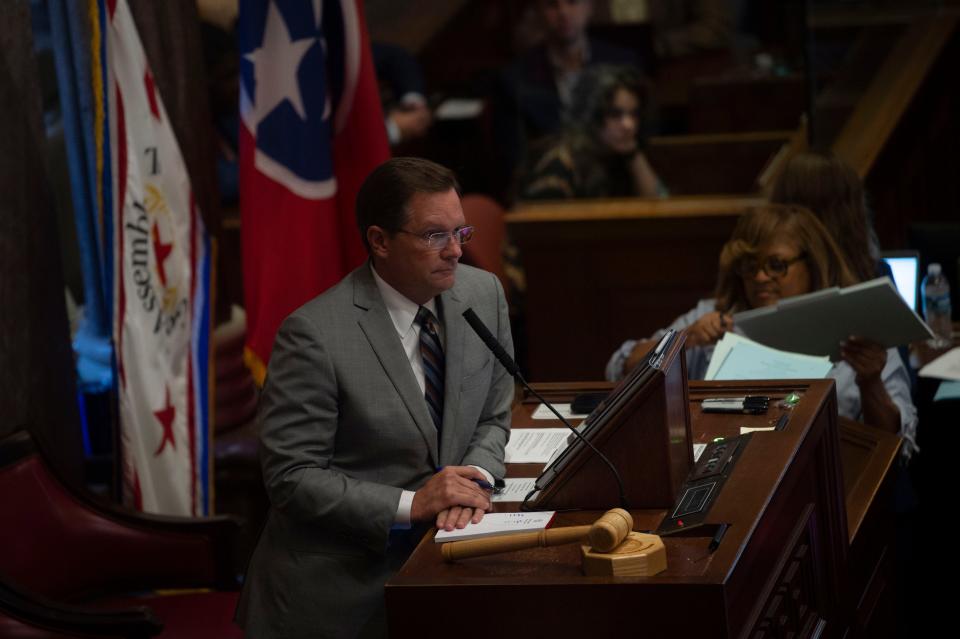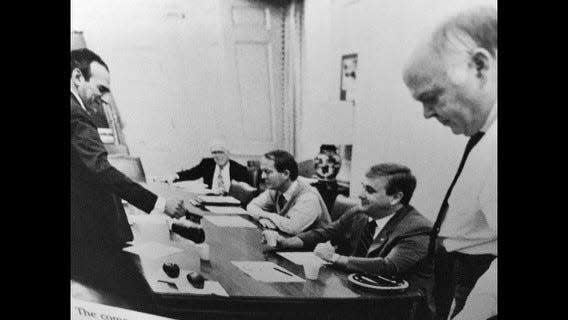Leadership is missing in the special session. It was not always this way in Tennessee. | Opinion
- Oops!Something went wrong.Please try again later.
The dysfunction on Capitol Hill over the last two weeks - with legislative bullies expelling even respectful Covenant School parents, the Senate and House in a bitter stalemate, the governor visibly absent – has stirred some fond memories of much stronger leaders in our recent history.
This “Lockdown Session” to make Tennesseans safer from gun violence has been a credit to nobody.
The most we can say, as the whole ugly affair lurches to its conclusion, is that Speaker Cameron Sexton’s plan to make the building quieter (and less arduous for his Republican cronies) worked with remorseless efficiency.
Another view: Governor Lee, don’t waste a crisis. Tell Tennessee lawmakers what you want out of special session
A play-by-play of the first week of special session
On the first day, Aug. 14, uniformed Tennessee Highway Patrol officers were visible and ready with a show of force – to add muscle to Sexton’s new Quiet Rule.

The next day, a delegation of respectful Covenant School parents was asked to leave, escorted by troopers out of a couple of committee galleries. They had run athwart another new rule: No Signs Allowed. Most of the moms left the room in tears.
(Remember: Lawmakers can carry personal firearms into the Cordell Hull State Office Building, where they meet in majesty, but ordinary citizens cannot carry a tiny 8-by-10 sign urging saner guns laws. Welcome to Tennessee.)
The next thing to notice here is that Governor Bill Lee has made himself scarce, all week long. If Tennessee’s chief executive has been phoning in his guidance, nobody’s claiming it. (He did meet with lawmakers on the last day of the special session on Aug. 22).
Lee is no doubt smarting from a general level of disrespect from his own party’s leaders in the General Assembly. Some of them even publicly asked him to walk back his promise to call this special session about curbing gun violence at all.
After convening, the defiant Republican extremists – so opposed to gun regulation, so beholden to the gun-industry lobbyists – operated with shielded impunity. They are respecting the wrong people.
Hear more Tennessee Voices: Get the weekly opinion newsletter for insightful and thought provoking columns.
Learn from past leadership
It wasn’t always this way.
Lee’s predecessors in the governor’s office, all very different men, shared a talent for facilitation for results when it came to big decisions in the legislation. Each of them had a knack for drawing other strong leaders into common cause as the situation required.
The Senate-House stalemate in Week One is the type of dispute that calls for management by an effective governor acting as honest broker, say, between the speaker of the Senate, speaker of the House, and other key players.
There’s no indication that Lee has played such a facilitator role in any aspect of the current policy train-wreck of this week.
Gov. Lamar Alexander came into office in 1979 in an historically unprecedented way. His predecessor, Ray Blanton, was under long-running FBI scrutiny for his handling of executive clemencies. His office had pardoned or paroled dozens of state prisoners for illegal cash payments.
The situation was so alarming that Democratic leaders in the legislature – Speakers Ned McWherter in the House, John Wilder in the Senate – agreed with the state’s Attorney General Bill Leech that Alexander should be sworn into office immediately to put Blanton out of power to release more prisoners. Such a maneuver had never happened before, in any state.
It was also clear that Alexander, a Republican, would have to be skillful in navigating any new programs through the Democratic-majority legislature going forward. His first idea - simple yet inspired - was to institute a new routine called The Leadership Meeting.
Sign up for Latino Tennessee Voices newsletter:Read compelling stories for and with the Latino community in Tennessee.
Sign up for Black Tennessee Voices newsletter:Read compelling columns by Black writers from across Tennessee.
How The Leadership Meeting worked
Every Wednesday at 7 a.m. Alexander hosted a breakfast meeting in his conference room at the Capitol. There were only eight participants – the two Speakers, their respective minority and majority leaders, plus Alexander and his finance commissioner – and these significant players would candidly talk over whatever business was at hand in the coming week. The meetings were held every Wednesday as long as the legislature was in session.

Any participant could introduce any topic, usually whatever legislative business was at hand for the week ahead. Each of the principals would bring up difficulties and possible solutions.
There were only two ground rules:
No surprises: If your caucus plans to oppose an administration bill later in the week, it can be forgiven, but you should share that plan with the group.
Speak only for yourself: If a news reporter asks you in the corridor about what we discussed, tell what you said, but each participant speaks only for himself.
Simple as this sounds, the “Leadership Meeting” strategy usually worked. It helped many administrations to navigate complex legislative terrains and a chief progress. Alexander achieved important coordination for his “Better Schools Program,” McWherter likewise for his landmark road-building program, Bredesen when the time came for balance the TennCare program budget, and so forth.
It became a weekly tradition for the rest of Alexander’s time in office, then by McWherter during his two terms, as well as for the future governors (Don Sundquist, Phil Bredesen and Bill Haslam) – every one of them, until Bill Lee.
During week one, Lee seemed visibly invisible in the day-to-day of this awkward session. When an issue is this hard, and forward progress so difficult, if you’re the governor your job is help transact the competing interests and move the ship forward to an acceptable result.
One longtime Capitol Hill observer suggested the current leaders on today’s Capitol Hill seem incapable of the same collaborative resolve and skills their predecessors possessed over most of the past half-century. “These people,” he said, “seem to have lost the thread about how to govern," he said.

Two most fundamental skills: A willingness to work hard for a worthy result, and also the skills and talent to negotiate with other peers to find bold solutions that serve citizens, not special interests.
Bill Lee appears to possess neither.
Keel Hunt is the author of four books on Tennessee political history, including “Crossing the Aisle: How Bipartisanship Brought Tennessee to the 21st Century and Could Save America.” He once worked for The Tennessean as a journalist and also worked in the Gov. Lamar Alexander administration. Read more at KeelHunt.com
This article originally appeared on Nashville Tennessean: Tennessee's special session devolved because of a void of leadership

